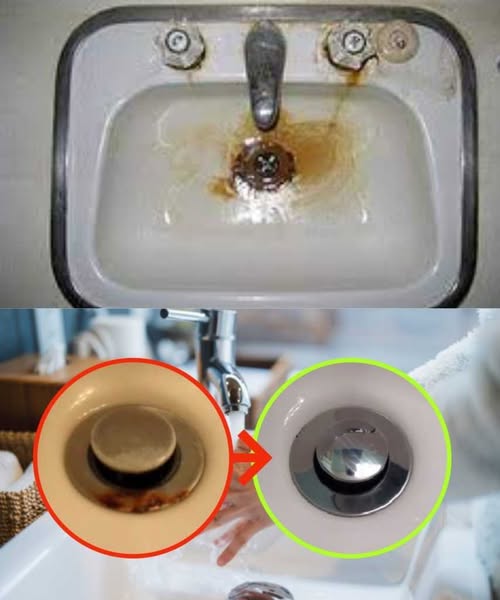ADVERTISEMENT
How to Revitalize Your Sink Economically and Effectively: Tips to Fight Rust
A sink is an essential part of any kitchen or bathroom, but over time, it can lose its shine due to rust, stains, and grime buildup. Rust can be particularly stubborn, making your sink look older and dirtier than it really is. However, before you rush to replace your sink or invest in expensive cleaning products, there are simple and cost-effective ways to revitalize your sink and get rid of that unsightly rust.
In this article, we’ll share some easy, budget-friendly methods to fight rust and restore your sink’s gleam using items you likely already have in your home.
Why Does Rust Appear on Your Sink?
Rust forms when metal (usually iron or steel) reacts with moisture and oxygen in the air. If your sink has areas that are exposed to water frequently—such as the drain or faucet areas—rust can form, especially if your sink is made of stainless steel, cast iron, or other materials prone to corrosion. Hard water minerals, soap scum, and leftover food particles can also contribute to rust buildup.
Now that we understand why rust occurs, let’s look at some easy, effective, and affordable ways to get rid of it.
Economical Tips to Fight Rust and Revitalize Your Sink
Here are some of the best home remedies to remove rust from your sink and restore it to its former glory.
1. Baking Soda and Vinegar: The Dynamic Duo
Baking soda and vinegar are two of the most powerful yet affordable cleaning agents you can find. The acidity in vinegar breaks down rust, while baking soda acts as a mild abrasive to scrub away the rust without scratching the sink.
What You’ll Need:
- 1 cup of vinegar
- 2 tablespoons of baking soda
- A soft cloth or sponge
Instructions:
- Start by sprinkling a generous amount of baking soda over the rust stains in your sink.
- Pour vinegar over the baking soda. You’ll notice some fizzing and bubbling, which means it’s working!
- Let the mixture sit for about 10–15 minutes to allow the vinegar and baking soda to break down the rust.
- Use a soft cloth or sponge to scrub the area in circular motions. The rust should start to loosen up.
- Rinse the sink thoroughly with water and wipe it dry with a clean cloth.
2. Lemon and Salt: A Natural Rust Remover
Lemon is a natural acid that can break down rust, and when combined with salt, it forms a powerful paste that can tackle tough stains. This is a great solution for mild to moderate rust buildup and is especially useful for sinks made of stainless steel or porcelain.
What You’ll Need:
- 1 lemon
- Salt (preferably coarse)
Instructions:
- Cut the lemon in half and squeeze the juice over the rust stains in your sink.
- Sprinkle salt directly onto the rust spots while the lemon juice is still active.
- Let the lemon and salt sit on the rust for about 10–15 minutes.
- Use a soft cloth or sponge to scrub the area gently. The salt will act as an abrasive, and the acidity from the lemon will dissolve the rust.
- Rinse the sink with water and wipe it dry.
3. Rubbing Alcohol and Steel Wool
If your sink has heavier rust spots, rubbing alcohol can help dissolve the rust and prepare the surface for cleaning. When combined with steel wool, this method works wonders for removing rust without causing major damage.
What You’ll Need:
- Rubbing alcohol
- Steel wool (fine grade)
Instructions:
- Dampen a soft cloth with rubbing alcohol and apply it to the rust spots.
- Let the alcohol sit for 5–10 minutes to loosen the rust.
- Gently rub the rust spots with a fine grade steel wool pad. The alcohol helps break down the rust, and the steel wool scrubs it away.
- Wipe the sink clean with a cloth and rinse it with water.
4. Cream of Tartar Paste
Cream of tartar, a byproduct of wine production, is an excellent natural abrasive and can be used to fight rust stains on your sink. It’s gentle on the surface but powerful enough to lift away rust buildup.
What You’ll Need:
- 1 tablespoon of cream of tartar
- 1 tablespoon of water
